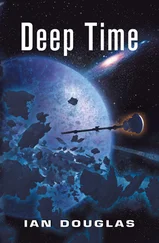Because they were alien, with alien ways of thinking and of expression far more extreme than any mere outward differences in appearance and biology, Koenig was careful when talking with them. They were here as guides; the Agletsch were interstellar traders whose homeworld lay somewhere within Sh’daar space, but who also ventured far beyond those boarders into other regions not claimed by the Sh’daar. When the Sh’daar had issued their ultimatum and the war had begun thirty-eight years ago, numerous Agletsch had been trapped inside Confederation territory. Some had left; many had stayed. The possibility that those who had stayed were acting as enemy agents—as spies —was worrisome to the Office of Naval Intelligence … but there’d never been any indication that the Agletsch were in contact with either the stay-at-home Agletsch or their Sh’daar masters.
When the Turusch defenders of the manufactory complex at Alphekka redeployed their fleets to trap the incoming Confederation battlegroup, Koenig had suspected an electronic hand-off of data at the H’rulka colony on Alchameth. Microscopic medical scans had turned up the implants; the Agletsch themselves had admitted that they were Sh’daar Seeds, a term that seemed to mean quasi-sentient computers that acquired, stored, and eventually uploaded data to a Sh’daar equivalent of the e-Net.
The question, so far as Koenig was concerned, was just what the range of the Sh’daar Seeds might be. If it truly was a few thousand kilometers, there was no chance of the Agletcsh passengers alerting Sh’daar forces in the target system upon Emergence.
But what if America engaged with enemy ships later on, within the target system’s core? If America passed within a thousand klicks or so of a Turusch battle cruiser, what information might be transmitted to the enemy?
That was why Koenig had ordered them to stay off the bridge and out of CIC, the nerve centers for both the carrier and the battlegroup. What they couldn’t see and hear, the Sh’daar Seed couldn’t store.
Unless there were other twists to the alien technology Koenig didn’t understand, or which the Agletsch were concealing.
How the hell could you tell if an alien was lying?
Another fleet commander might have ordered the two aliens thrown in the brig and surrounded by a Faraday cage … or even killed. Koenig didn’t want to take a step that drastic, not yet. The Agletsch so far had been most helpful in their general information about the Turusch Directory, and about the nature of the worlds listed there.
“A few thousand kilometers?” Koenig said after a long and thoughtful pause. “I’ll accept that.” He thoughtclicked an in-head icon, and the holographic image above his desk winked out. “I still don’t want you in certain sensitive areas of the ship, though. I don’t know if these Seeds you’ve described can probe our electronic systems, or if they’re just eavesdropping on what we say.”
“This we do understand, Admiral.”
The information transmitted to the Sh’daar at Alchameth had actually consisted of a speech Koenig himself had made over the shipboard intercom. He’d mentioned that their designation was Alphekka, and the Sh’daar Seeds, evidently, had been smart and autonomous enough to figure out which star system that was—the Sh’daar didn’t call it “Alphekka,” certainly—and pass on the warning.
If he understood what the Agletsch were describing, billions, perhaps trillions of separate Sh’daar Seeds were planted inside individual members of various subject species: Turusch, H’rulka, Nungiirtok, and some tens of thousands of other species. Each individual then, became a free-moving and independent computer node within an incredibly vast and far-flung network.
No one had yet intercepted a Seed transmission, however. How powerful they might be, what their range was, how easily shielded such signals might be, their duration, all of that was as yet unknown.
Koenig wondered if Gru’mulkisch and Dra’ethde knew how many high-tech sensors were focused on their bodies at every hour of shipboard day and night, using America ’s own internal electronic Net, with the intent of capturing and recording a transmission in order to learn more about its capabilities.
“There remains much that we do not understand about the Seeds’ capabilities ourselves,” Dra’ethde told him. “We know simply that they are.”
“And that they are what you would call a fact of life,” Gru’mulkisch added. “Yes-no?”
“We would very much like to know,” Koenig said carefully, “if we can use access to the Sh’daar Seeds—meaning through you two—to communicate with the Sh’daar directly. Since you delivered their ultimatum thirty-some years ago, we’ve not been in direct contact. Being able to talk to them might help us avoid needless bloodshed.”
Not to mention, Koenig added to himself, the extinction of the humans species.
“It is possible,” Dra’ethde told him, “though it would take time to pass communications from node to node all the way to the old galactic core. We would need to be in contact with another transmission node, however.”
“Hold up, there,” Koenig said. “What did you just say? ‘Old galactic core’? I’ve not heard that term.”
“Indeed? We don’t know anything about it either, save that it is what the Sh’daar call their … not homeworld. But the region where their homeworld lies.”
“Is that the core of this galaxy? What we call the Milky Way?”
The aliens exchanged a momentary glance of weaving eyestalks. “We don’t know,” Gru’mulkisch said. “It is simply a name. Gu reheh’mek chaash . You would say ‘old galactic core’ or perhaps ‘center of the old galaxy,’ yes-no?”
The galactic core, Koenig thought, that teeming mass of billions of close-packed stars residing at the heart of the Milky Way, lay roughly 25,000 light years away in the direction of the constellation Sagittarius. It was old, yes—as old as the galaxy, which by best estimates had formed about 12 billion years ago. But why distinguish it as the old core? Or the old galaxy …
Was Gru’mulkisch suggesting that the Sh’daar had come from a different galaxy?
That set the hairs at the back of his neck prickling. No one knew quite how large the Sh’daar expanse of space actually was, though intelligence estimates based on interviews with the Agletsch suggested that it embraced something like half of the galaxy—perhaps as much as two thirds, perhaps as little as a quarter. That was big enough … but if they had the technology to travel between galaxies, to come to this one from some other galaxy hundreds of thousands or even millions of light years away …
What the hell did they mean by “old galactic core”?
He flagged the term with a mental note. He would forward it to the ONI boys down in Intel and see what they could make of it.
Koenig considered the two aliens for a moment. First Contact with the Agletsch had occurred in 2312, nearly a century ago, but humans still knew remarkably little about them. The Agletsch as a species were interstellar traders, star-faring merchants, of a sort. Not traders of material goods, of course. One solar system contained much the same in the way of natural resources—water ice, organic volatiles, metals, energy—as the next. Even cultural artifacts—artwork, say, or textiles or gemstones or commercial items of technology—could be carried between the stars far more efficiently as stored patterns of information rather than the original bulk items.
So the Agletsch traded in information, a kind of universal medium of exchange. And for ninety-three years they’d shared very little about themselves, or about their galactic masters, the Sh’daar. As Koenig understood it, merchants like Dra’ethde and Gru’mulkisch traveled far beyond the borders of their own stellar polities and lived for decades as visitors to other cultures, other civilizations, where they recorded what they could, and determined what, if anything, the new civilization had to trade. One observer had likened them to alien Marco Polos in the courts of alien Khans. Another had once suggested that they were a kind of living Encyclopedia Galactica , slowly accumulating information on all sentient life throughout the galaxy … which they would trade to others in exchange for more such information.
Читать дальше












